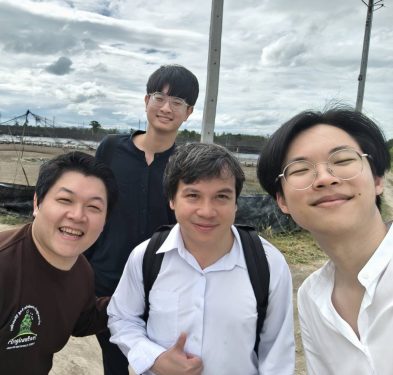Water quality is the most critical factor for aquaculture farms to monitor, ensuring the health of their livestock. While current methods like sensors and water testing kits exist, they are often too costly for many farmers in regions such as Southeast Asia. Aquawise aims to provide these farmers with a better solution for monitoring water quality by using artificial intelligence and existing satellite imagery, eliminating the need for any hardware purchases.
Based in Bangkok, Aquawise processes satellite images of fish and shrimp farms through its physics-based AI model. This system monitors key water quality indicators including temperature, chlorophyll levels, and oxygen concentrations. The platform enables continuous monitoring of water conditions, a significant improvement over traditional methods that typically check water quality only on a daily or weekly basis. Additionally, Aquawise offers tracking and predictive capabilities.
The company’s CEO and co-founder, Patipond Tiyapunjanit, emphasized the importance of water quality in aquaculture. He compared it to human breathing, noting that aquatic life resides entirely in the water. If water quality falls outside optimal levels, it can induce stress, trigger disease outbreaks, and lead to other serious problems.
Aquawise will present its technology at the Startup Battlefield competition during TechCrunch Disrupt 2025, held from October 27 to 29 in San Francisco’s Moscone West.
Tiyapunjanit, who is nineteen, explained that the company’s origin stemmed from his fascination with shrimp, which evolved into a research project focused on shrimp larvae. While presenting his project at the 2023 Young Scientist Competition, he met his future co-founders, Chanati Jantrachotechatchawan and Kobchai Duangrattanalert, who were advising a competing team. Impressed by Tiyapunjanit, they began advising his project, which later won the 2024 Regeneron International Science and Engineering Fair.
The team then shifted their focus to identifying the most pressing issue within the aquaculture industry. They discovered that water quality was a fundamental problem, affecting eighty percent of aquaculture farms and resulting in nearly thirty billion dollars in annual losses. This finding became the foundation for Aquawise, which was established in 2024.
As co-founder Kobchai Duangrattanalert noted, water quality is a more significant challenge in developing regions like Southeast Asia compared to places like the United States or Europe. Farmers in these areas often cannot afford advanced monitoring technology and instead depend on weather reports and manual water checks, despite the severe risks associated with poor water conditions.
Aquawise initially explored using sonar technology for monitoring. Their original concept involved using acoustic sonar to gather data from water, even testing it on a fish tank at Tiyapunjanit’s home. However, they concluded that this approach would still represent a financial barrier for the farmers they aimed to serve.
The company is committed to making its technology accessible to improve the livelihoods of farmers across Thailand and the wider Southeast Asia region. Aquawise is currently collaborating with multiple farms, using the collected data to further train and refine its AI model. Ensuring the model’s accuracy is a priority before the company begins commercial sales to farms.
The startup also plans to seek investment funding in the coming year. Tiyapunjanit highlighted the global significance of aquaculture, describing it as the fastest-growing food sector. He referenced United Nations projections identifying aquaculture as the best method to help feed a global population of ten billion people in the future, due to its ability to produce highly nutritious food with relatively low emissions.

